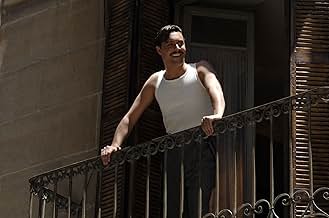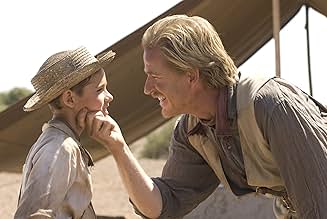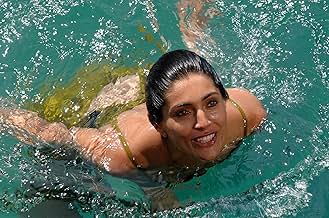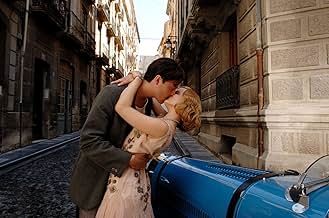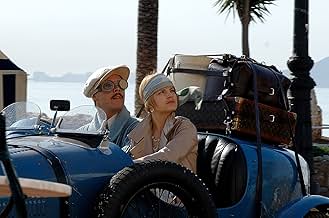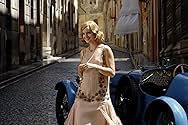VALUTAZIONE IMDb
5,2/10
1299
LA TUA VALUTAZIONE
Aggiungi una trama nella tua linguaA young American writer completes his service in WWI and travels across Europe with his wife and her attractive Italian girlfriend. Based on the novel by Ernest Hemingway.A young American writer completes his service in WWI and travels across Europe with his wife and her attractive Italian girlfriend. Based on the novel by Ernest Hemingway.A young American writer completes his service in WWI and travels across Europe with his wife and her attractive Italian girlfriend. Based on the novel by Ernest Hemingway.
- Regia
- Sceneggiatura
- Star
Mathias Koie Levi Palsvig
- Young David
- (as Mathias Palsvig)
Héctor Tomás
- Patrice
- (as Hector Tomas)
Álvaro Roig
- Vladimir
- (as Alvaro Roig)
Yaël Belicha
- Girl Onlooker
- (as Yael Belicha)
María Miguel
- Nina
- (as Maria Miguel)
Enrique Zaldua
- Waiter #2
- (as Enrique Zoldua)
Recensioni in evidenza
Mena Suvari delivers every line like a ridiculous declaration. She's a horrible actress and this is a horrible movie. I didn't read the book but I have to assume it must be better than the film adaptation because it sure can't be worse.
What a boring story and the acting is so bad that it's hard to focus. Useless irritating characters, just wanted them all to fall of a cliff so the movie could end.
This is a very mediocre movie with really good actors who have done everything to give shape to this story. Mena Suvari and Caterina Murino are great in their roles even if these roles are incomplete for understand their stories. For Jack Huston I did not feel anything. He is just not the right actor for the role maybe, he seems too young and perfect to be credible. The story remains shallow, despite the inspiring beginning and how seductive the first 30 minutes looks - it then became flat. The characters are not developed enough to make them believable. They are a cool couple but without any reason to do what they do?. Sad to see what could be a good movie in the right hands. The photography and aesthetic in the movie is good, also beautiful locations, however the lack of depth make this almost disappear. I feel disappointed after watching it.
5Geff
As someone who has studied and taught Hemingway for 40 years and read all his works, countless times, I think the main question here is what would Hemingway himself think of the way he is portrayed in this film. Remember please that someone else finished and edited the entire novel. So can you say it was written by Hemingway? What would he himself think about this work, which was so important to him that he worked on it for decades, and could never get it right enough to finish it. I think he would be enraged and feel betrayed by those who rewrote his work. Hemingway was so unique as a person with a true gift for saying so very much in so very few words, and so unique as a person who had deep human needs coupled with a fearlessness possessed by few, that I dare anyone to copy his style successfully. I have done that over the years, and I've never seen anyone succeed. So finishing the novel, and editing the entire work by another or others, is a fraud to call it a Hemingway novel or film based on it.
Based on a posthumously released novel written by Ernest Hemingway, Garden of Eden takes place prior to the Great Depression, during the Jazz age, following a successful young American writer, David Bourne (Jack Houston), and his new bride, Catherine (Mena Suvari), a rich heiress, who are on an extended honeymoon in Europe. During the honeymoon, Catherine starts to get restless and begins playing bizarre mind games with David, testing his devotion. To David's discomfort, she persuades him to role play in the bedroom, with her as the boy and him as the girl. Things get stranger when Catherine develops a relationship with an Italian girl, Marita (Caterina Murino), and brings her to him as a "present", even suggesting they take turns being David's wife.
Directed by John Irvin (Hamburger Hill, Dogs of War), this film is more character-driven than plot-driven. There is much sex going on, focusing on the strange love triangle between David, Catherine, and Marita. The focus and the pace of the film changes noticeably when it moves on to David's past memories of his father, an elephant hunter in Africa. These memories, which are quite out of place from the rest of the film, become material for David's new book.
This film is beautiful to look at. It is a period film--the mood, clothing, and environments recreate the early part of the 20th century in fine detail, soft sepia filters, and a pastel color scheme. There's an impressive tracking shot in the beginning of an outdoor banquet, of rich folks raising their glasses in slow motion. We soon see a naked lady being filmed at a picnic, re-enacting Manet's "The Luncheon on the Grass". Small moments like these amusingly portrays a certain mindset of this particular society. Advertisement
It the film, David Bourne appears to be Hemingway's alter ego. While Jack Huston looks like the young Hemingway, his character is far from the heavy-drinking, macho guy the famous author was known for. He is constantly pushed around by the neurotic Catherine, whom he is always trying to please, which becomes increasingly hard to do. Catherine has some amount of disdain for David's work and becomes jealous when Marita admits to having read his transcript. Throughout the film, David half-jokingly calls Catherine "Devil."
Admittedly, the characters here are not very engaging. Jack Houston does what he can with his role, but his character never feels like a whole person. Mena Suvari has a meatier role as Catherine, who brings much intensity to the film. However, we never quite know why she acts the way she does and her dialogue feels stilted. Caterina Murino (Casino Royale) is competent as Marita, despite the character's lack of complexity.
Given the title of the film, Garden of Eden, a reference to the Bible, one might say David represents Adam and Cartherine represents Eve. Perhaps the theme speaks about a picture-perfect couple who are tempted toward a wrong way. In this film, though, it appears to be mostly Catherine who brings things down for them. Or, it could just be that Catherine is actually the serpent (as David called her "Devil.") bringing Marita (Catherine's "present") as the fruit to tempt David to fall. It is indicated that Catherine wants to share her "sin" (Marita) with David to feel less guilty about her extramarital relationship with Marita.
One wonders if Hemingway could be using Catherine to represent certain attitudes within radical feminism. The film also touches upon morality and class. Catherine says something along the lines of "we are not like normal people--we can live our life however we want." Given that this film was based on an incomplete novel, it is hard to say what Hemingway really wanted to say, or if he had a particular message. It could just be a character study. As it is, the film feels uneven and the characters are not very engaging. Perhaps it is meant to be read as a novel and not seen as a film.
More of my movie review updates can be found at http://twitter.com/d_art
Directed by John Irvin (Hamburger Hill, Dogs of War), this film is more character-driven than plot-driven. There is much sex going on, focusing on the strange love triangle between David, Catherine, and Marita. The focus and the pace of the film changes noticeably when it moves on to David's past memories of his father, an elephant hunter in Africa. These memories, which are quite out of place from the rest of the film, become material for David's new book.
This film is beautiful to look at. It is a period film--the mood, clothing, and environments recreate the early part of the 20th century in fine detail, soft sepia filters, and a pastel color scheme. There's an impressive tracking shot in the beginning of an outdoor banquet, of rich folks raising their glasses in slow motion. We soon see a naked lady being filmed at a picnic, re-enacting Manet's "The Luncheon on the Grass". Small moments like these amusingly portrays a certain mindset of this particular society. Advertisement
It the film, David Bourne appears to be Hemingway's alter ego. While Jack Huston looks like the young Hemingway, his character is far from the heavy-drinking, macho guy the famous author was known for. He is constantly pushed around by the neurotic Catherine, whom he is always trying to please, which becomes increasingly hard to do. Catherine has some amount of disdain for David's work and becomes jealous when Marita admits to having read his transcript. Throughout the film, David half-jokingly calls Catherine "Devil."
Admittedly, the characters here are not very engaging. Jack Houston does what he can with his role, but his character never feels like a whole person. Mena Suvari has a meatier role as Catherine, who brings much intensity to the film. However, we never quite know why she acts the way she does and her dialogue feels stilted. Caterina Murino (Casino Royale) is competent as Marita, despite the character's lack of complexity.
Given the title of the film, Garden of Eden, a reference to the Bible, one might say David represents Adam and Cartherine represents Eve. Perhaps the theme speaks about a picture-perfect couple who are tempted toward a wrong way. In this film, though, it appears to be mostly Catherine who brings things down for them. Or, it could just be that Catherine is actually the serpent (as David called her "Devil.") bringing Marita (Catherine's "present") as the fruit to tempt David to fall. It is indicated that Catherine wants to share her "sin" (Marita) with David to feel less guilty about her extramarital relationship with Marita.
One wonders if Hemingway could be using Catherine to represent certain attitudes within radical feminism. The film also touches upon morality and class. Catherine says something along the lines of "we are not like normal people--we can live our life however we want." Given that this film was based on an incomplete novel, it is hard to say what Hemingway really wanted to say, or if he had a particular message. It could just be a character study. As it is, the film feels uneven and the characters are not very engaging. Perhaps it is meant to be read as a novel and not seen as a film.
More of my movie review updates can be found at http://twitter.com/d_art
Lo sapevi?
- QuizThis is the fiftieth adaptation of an Ernest Hemmingway story.
- BlooperThe typewriter Catherine buys for David has a QWERTZ keyboard. This keyboard is common in German-speaking parts of Europe, but is not used in France where the movie takes place.
- Citazioni
David Bourne: You know you want to be careful about Absinthe. It tastes like remorse, yet it takes it away.
- Colonne sonoreThe Jefferson Stomp
(uncredited)
Performed by Raimond Bugatti and his Platinum Lounge Syncopators
I più visti
Accedi per valutare e creare un elenco di titoli salvati per ottenere consigli personalizzati
Dettagli
- Data di uscita
- Paesi di origine
- Lingua
- Celebre anche come
- Hemingway's Garden of Eden
- Luoghi delle riprese
- Los Alcázares, Murcia, Spagna(Hotel des Voyageurs scenes)
- Aziende produttrici
- Vedi altri crediti dell’azienda su IMDbPro
Botteghino
- Lordo Stati Uniti e Canada
- 22.083 USD
- Fine settimana di apertura Stati Uniti e Canada
- 12.404 USD
- 12 dic 2010
- Lordo in tutto il mondo
- 22.083 USD
- Tempo di esecuzione1 ora 51 minuti
- Colore
- Mix di suoni
- Proporzioni
- 1.85 : 1
Contribuisci a questa pagina
Suggerisci una modifica o aggiungi i contenuti mancanti

Divario superiore
By what name was The Garden of Eden (2008) officially released in Canada in English?
Rispondi

